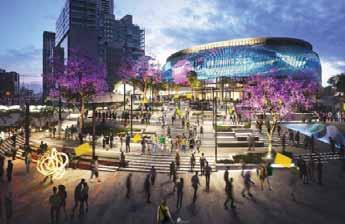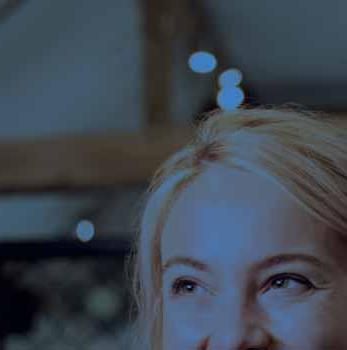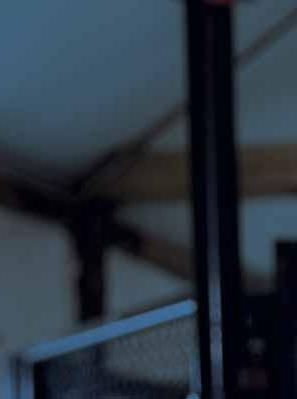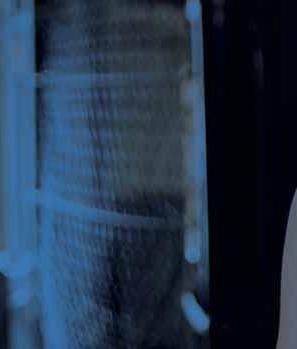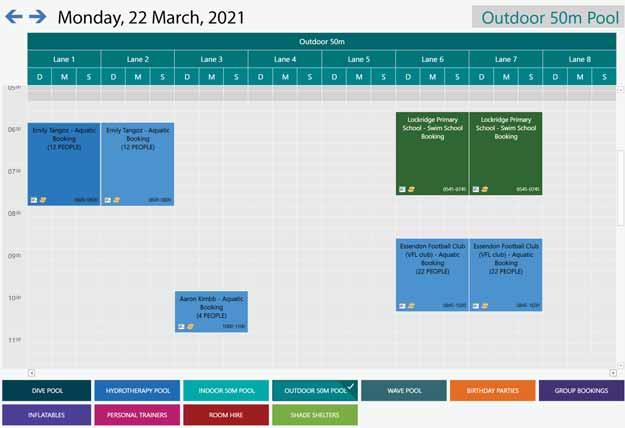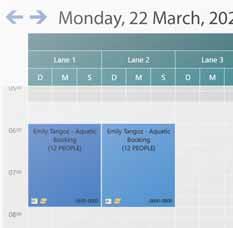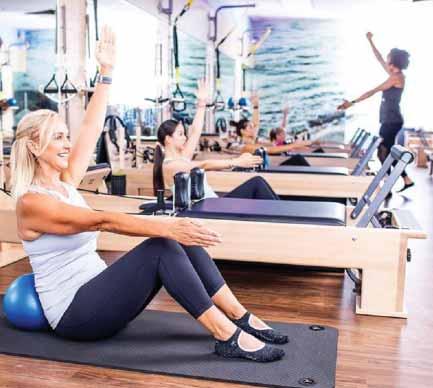
5 minute read
Paralympics Australia aims for Societal Change
Sarah Walsh set a new Oceania record in the T44 long jump at her Paralympic debut at the Rio 2016 Paralympic Games. Credit: Paralympics Australia.
Paralympics Australia aims for
Advertisement
2032 Brisbane Games to deliver societal change
David Sygall of Paralympics Australia sees that Brisbane and South East Queensland’s hosting of the 2032 Olympics and Paralympics Games will supercharge a decades-long journey to embed Para-sport as a means for societal change.
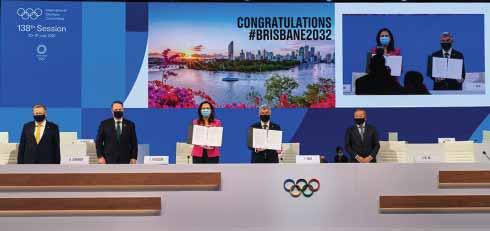
Brisbane and South East Queensland’s successful hosting bid for the 2032 Olympics and Paralympics Games represents the culmination of years of collaboration between the Federal Government, Queensland Government, Brisbane City Council and other local governments in South East Queensland, in partnership with the Australian Olympic Committee and Paralympics Australia.
Brisbane 2032 will build on the powerful legacies of the landmark Sydney 2000 Paralympics, the London 2012 Paralympics where social legacy outcomes came of age, and the Gold Coast 2018 Commonwealth Games, which set new standards for accessibility and equality for Para-sports and Para-athletes.
Paralympics Australia President Jock O’Callaghan said the impacts of Brisbane 2032 would reinforce the Paralympic Movement’s strength in demonstrating what people with a disability can achieve and contribute in sport and beyond, and how and why they should be supported to realise their goals.
O’Callaghan states “we (now) begin the next chapter of a quest that started when the first Paralympic Games was staged, in Rome in 1960 - that is, the mission to facilitate fair recognition and opportunities for people who live with a disability.
“Since those first Games, the Paralympics has grown to become far and away the world’s biggest event for promoting inclusion, a global showcase of the true value of sport.
“This means that hosting the Games opens up extensive opportunities. Over the next decade, as we lead into Brisbane 2032, long term benefits will be realised across Australia, including in employment, skills, education, health and wellbeing outcomes, higher sporting participation rates, and in culture and community connection.
“Our vision and plans are ambitious, as they should be. We will be guided by a relentless focus on inclusion, diversity and accessibility and we’ll be driven by the Paralympic ideals of determination, equality, inspiration and courage.”
The pillars upon which Paralympics Australia and its Games partners will pursue their targets are: Establishing greater sport participation: We will establish new community programs and expand existing ones to encourage greater awareness and participation in sport, especially for people with a disability. These will include ‘Come and Try’ events, community sport forums and subsidised equipment funds. Our shared goal is to engage in sport a further 500,000 people with a disability by 2032. Increasing social inclusion and community connection for people with a disability: We will develop and implement extensive campaigns and strategies and engage closely with governments, human rights
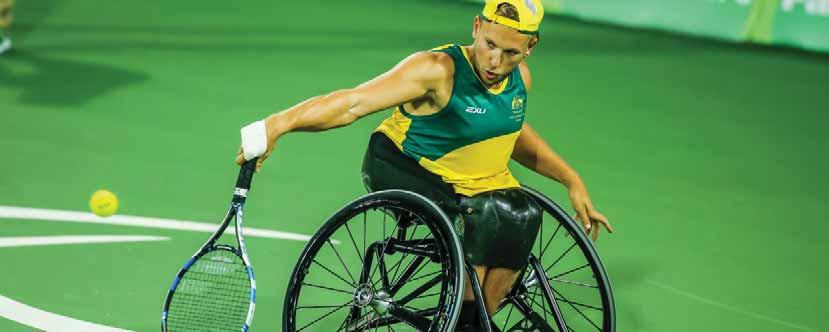
Rio 2016 Dylan Alcott Quad Singles Semifi nal Wheelchair Tennis. Credit: Paralympics Australia.
and anti-discrimination agencies, and disability and inclusion organisations to create and embed positive perceptions around disability. Advancing physical and mental health goals: We will use the 2032 Games profile to promote the value of participation in sport and its quantifiable social and physical health benefits. We will work with governments to advance health and physical outcomes by aligning with the goals of Australia’s Long-Term National Health Plan, National Obesity Strategy and National Preventative Health Strategy. Our aim is to reduce inactivity among Australians by 15% by 2030. An extensive schools and education program: Brisbane 2032 will include Australia’s most extensive schools education program, modelled on Paralympics Australia’s successful Paralympic Education Program, which aims to challenge students’ perceptions and attitudes towards people with a disability. This is carried out by inviting Paralympians into schools nationally and teaching students about the Paralympic Games and Para-sports, while providing students with a disability an introduction to Para-sport and the opportunities created by the Paralympic Movement. Facilitating greater employment opportunities: Just as the London 2012 Paralympics transformed attitudes in Great Britain and led to a steep increase in employment of people with a disability, we will work with the Federal and Queensland Governments and Brisbane and regional councils to achieve similar outcomes by creating new and innovative jobs for people with a disability and encouraging businesses to embrace inclusion. Furthering integrated government engagement: We will advocate for Governments to deliver investment and pass legislation that will benefit future generations of people living with disability. Aligning with Sustainable Development Goals: Brisbane 2032 will align with the International Paralympic Committee’s commitment to advance the United Nation’s Sustainable Development Goals, including promoting greater inclusion in sport for women with a disability.
Paralympics Australia Chief Executive, Lynne Anderson (who will step down at the end of the year) added “many people don’t yet truly realise the benefits that flow from a Paralympic Games. It’s not just about sporting performances, there is so much more that the Paralympic Games offers by shining a spotlight on the strength of diversity in communities.
“The real key for us as custodians of the Paralympic Movement in Australia is about the social impact that the 2032 Paralympic Games will bring. The fact is there is still inequity for Australians with a disability. There isn’t universal accessibility to venues or transport. Those with a disability who want to try a new sport or find a new club don’t always have that chance through no fault of their own. It is because our society is still not equipped to cater for all abilities.
“We know the Paralympic Games challenges stereotypes, changes perceptions and helps break down barriers. We want these Games to leave the enduring legacy of a more cohesive and inclusive Australia.
“The sporting spectacle of a Paralympic Games in 2032 will be incredible. Once you go to a Paralympic Games, you are changed. You can’t not be.” David Sygall is Communications Manager at Paralympics Australia.
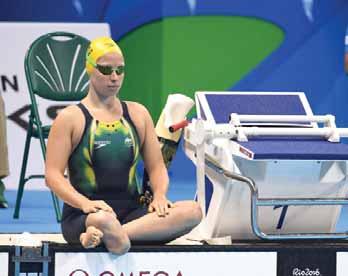
Rio 2016 Paralympic Games Para swimming Monique Murphy. Credit: Paralympics Australia Speedo strengthened their commitment to Australian Paralympic Team with renewed partnership for Tokyo 2020. ASM Global’s planned Brisbane Live! (Brisbane Arena) will be a key 2032 Games venue.
